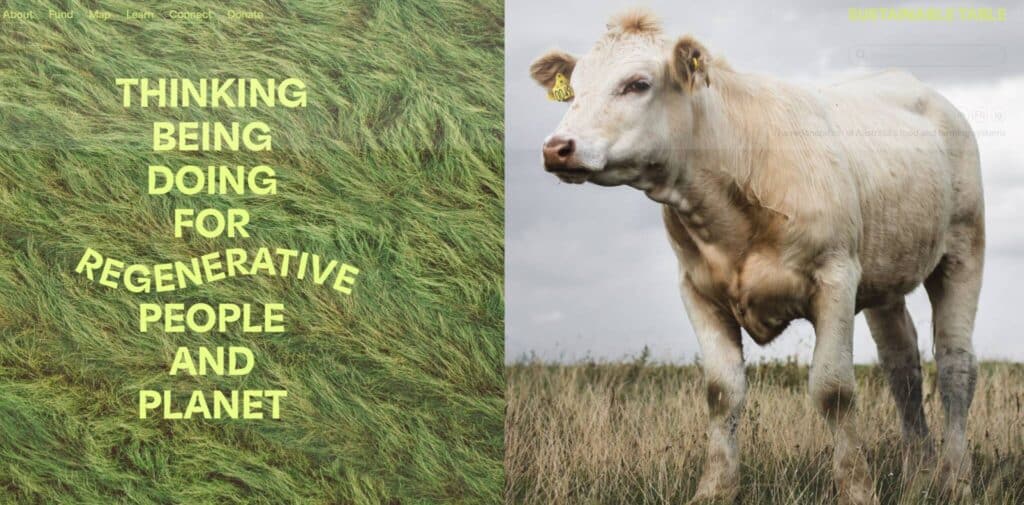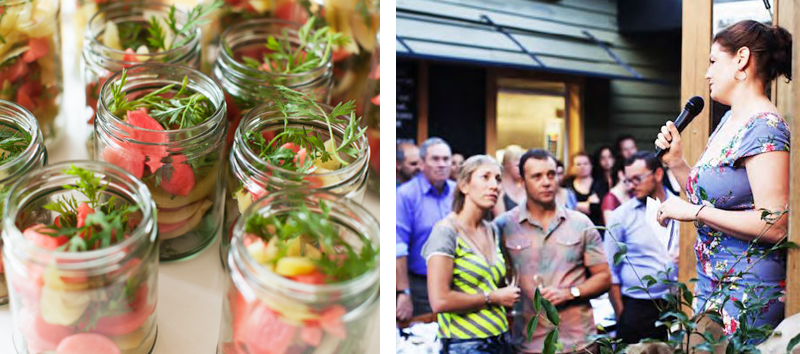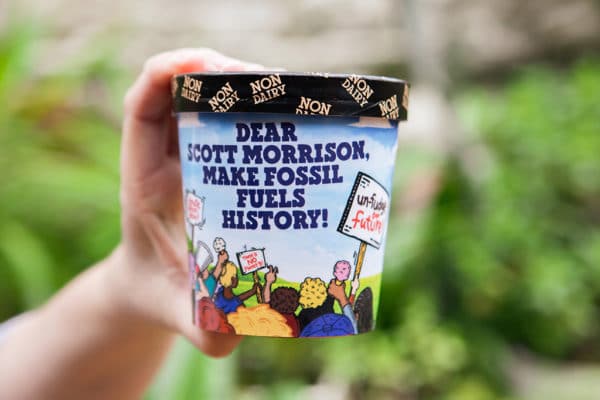Sustainable Table Is Campaigning for a Food System That’s Fair, Humane and Good for the Environment
Kira Simpson
Imagine a world where we know exactly how our food is raised, knowing it was done so in an ethical and humane way.
A world where we know where our produce is grown, the people who grew it and how far it has to travel.
A world where two giant supermarkets peddling processed and out-of-season food were not the go-to places for buying our groceries.

Sustainable Table is helping people learn exactly that – all in one easy-to-access online space. The Australian not-for-profit is campaigning for a sustainable food system that’s fair, humane, healthy and good for the environment.
“Every dollar we spend is a vote for the type of food system we’d like to be a part of – so spend mindfully friends.”
I caught up with Co-founder Cassie Duncan to talk about the importance of knowing where our food comes from and why we need a food revolution.
Sustainability, straight to your inbox
Monthly tips, stories, and inspiration to make living greener easy

I love Sustainable Table, it’s such an incredible resource! It’s been my go to site recently when I need to find a grocer or supplier. ?
I had always considered myself a bit of a greenie.
I rode my bike everywhere, kept lighting to a minimum, had super short showers and loved to get out and about in nature.
But it wasn’t until my mid-20s that I connected what I put in my mouth with the impact I was having on the planet. I started a not-for-profit by another name with a school friend, Hayley, and we initially set out to educate people on climate change issues. This generalist approach was failing to gain the traction we had hoped, then one day we hosted a session on food.
The whole mood in the room changed, and we realised that if we could utilise people’s passion for food to have a broader conversation around sustainability, then this would be a powerful thing. Sustainable Table was born.
I wrote an educational cookbook, The Sustainable Table, which exceeded our expectations in terms of sales and went on to win Best Sustainable Food Book at the 2012 Gourmand World Cookbook Awards in Paris. The website is an extension of the book.
From the outset we wanted the organisation to be approachable and not to alienate. Not one person has all the answers to the global challenges we face, but if we open our hearts and minds to learn from one another, then we have the collective power to turn the tide.
Like our supporters, I am just a consumer trying to navigate the best way to purchase food that supports the health of the planet, my family and the workers and animals within that chain. At Sustainable Table, we’re attempting to make ethical eating easy because we know not everyone has the time to obsess over the details in the same way we do.
We’re also here to share the stories of the incredible people who are providing delicious alternatives to industrial agriculture, be it the farmers, the farmers’ market organisers, the bulk food stores, the backyard gardeners, the list goes on!

Do you think we’ve become disconnected from our food and how it’s grown and raised?
We certainly have and that is by nature of how our communities are now organised.
More and more people live in cities, separated from where our food comes from and how it is grown or raised. Because we don’t have to face how animals are raised and slaughtered, it becomes an easy decision to eat more meat than we used to. It’s also in the interest of large food companies for consumers not to know the intricacies of our food system, which can sometimes make it extremely hard for eaters to make informed decisions even if they’d like to.
I believe that most of us are good people and do not intentionally make decisions that lead to animals suffering, environmental degradation or reduced farmer welfare, we’re just all so busy and must juggle competing priorities.
Unfortunately food purchasing often becomes a chore and the origin of that food a low priority. At Sustainable Table, we’re trying to reconnect people with their food source, helping them to see that food not only sustains life on this planet, but its production is also dependent on healthy natural systems. We’re trying to make its provenance a priority again for people.
Because if we know where and how our food is grown, we can begin to value it differently.
What do you think is the biggest challenge we face in the food industry, and how do we overcome it?
There are so many issues, but I do think the centralisation of power within the food system is a huge factor. We have just a couple of major supermarkets here in Australia who control around 70% of the market, which gives them an incredible amount of power when it comes to influencing the price the grower receives and the price the customer pays, often leading to huge inequalities along the chain.
The same goes for the meat industry, where the predominant form of farming in Australia is in factory farms where over 500 million animals each year are confined in abhorrent conditions never to see the light of day.
My belief is that education and awareness will overcome this, as well as a policy shift towards valuing Australian food producers and supporting them to farm in a more ethical way that is less reliant on synthetic fertilisers, pesticides and housing animals inhumanely.
As we have recently seen with the War on Waste series on the ABC, information is power, and people respond well to small changes they can make to improve the planet.
We believe that if the information we provide encourages just one family to reduce their meat intake and look for organic/free range alternatives, seek out their closest accredited farmers’ market or bulk food store to reduce single-use plastic packaging, then we are doing our job. Because that family will tell someone else, who will tell someone else, and before we know it there will be thousands of people who eat a little better and thus live a little better.
This has knock-on effects for farmers and animal welfare, and also has vast environmental benefits.

You also run workshops and host dinners.
We often host talks, workshops and dinners to connect people who want to learn about supporting a food system that is fair, healthy, humane and good for the environment. It’s about bringing people together to learn from and inspire each other. (you can find our more about them here)
What’s been the most rewarding part of creating and growing Sustainable Table?
It is by far the people I have met along the way and feeling part of a community of people who genuinely care about the state of the planet and how our food choices impact that.
Writing and researching The Sustainable Table connected me with so many incredible farmers, chefs, backyard gardeners and schools to name a few. And then in the production of our second book Seasonal Regional I was able to broaden those connections. When you surround yourself with passionate people, incredible things happen.
The Give A Fork! Campaign, is a fantastic idea and I’m a little sad it’s not running this year! How did it come about?
Give a Fork! is a campaign aimed at bringing about positive change through the food we eat. The campaign gets people thinking about the environmental and ethical impact of the food we buy, whilst bringing the sexy back into caring. That’s why we coined the term Grexy (green + sexy).
We wanted to run a campaign that engages people in a month-long challenge aimed at beginners, through to the diehard greenie.
We also wanted to have a little bit of fun with it, because caring for the planet doesn’t always have to be deep and depressing. You don’t have to quit your day job to show that you care, Give a Fork! is the vehicle for people to make small changes that add up to a lot. We recognise that even for us at Sustainable Table, change hasn’t happened overnight, so we wanted to embody the way we learnt about the issues into a campaign that encourages incremental steps over a month.
What does the future hold for you and Sustainable Table?
Right now, securing funding to continue what we do presents the biggest challenge so we are exploring partnerships and enterprises that may allow us to generate a little bit of income whilst also furthering our aims to empower people to reduce waste, eat with intent and educate themselves about where their food comes from.
The world needs more….
…..people sitting down at the dinner table together, connecting with one another and discussing and appreciating the food that brings them together.
Check out Sustainable Table’s site here.

